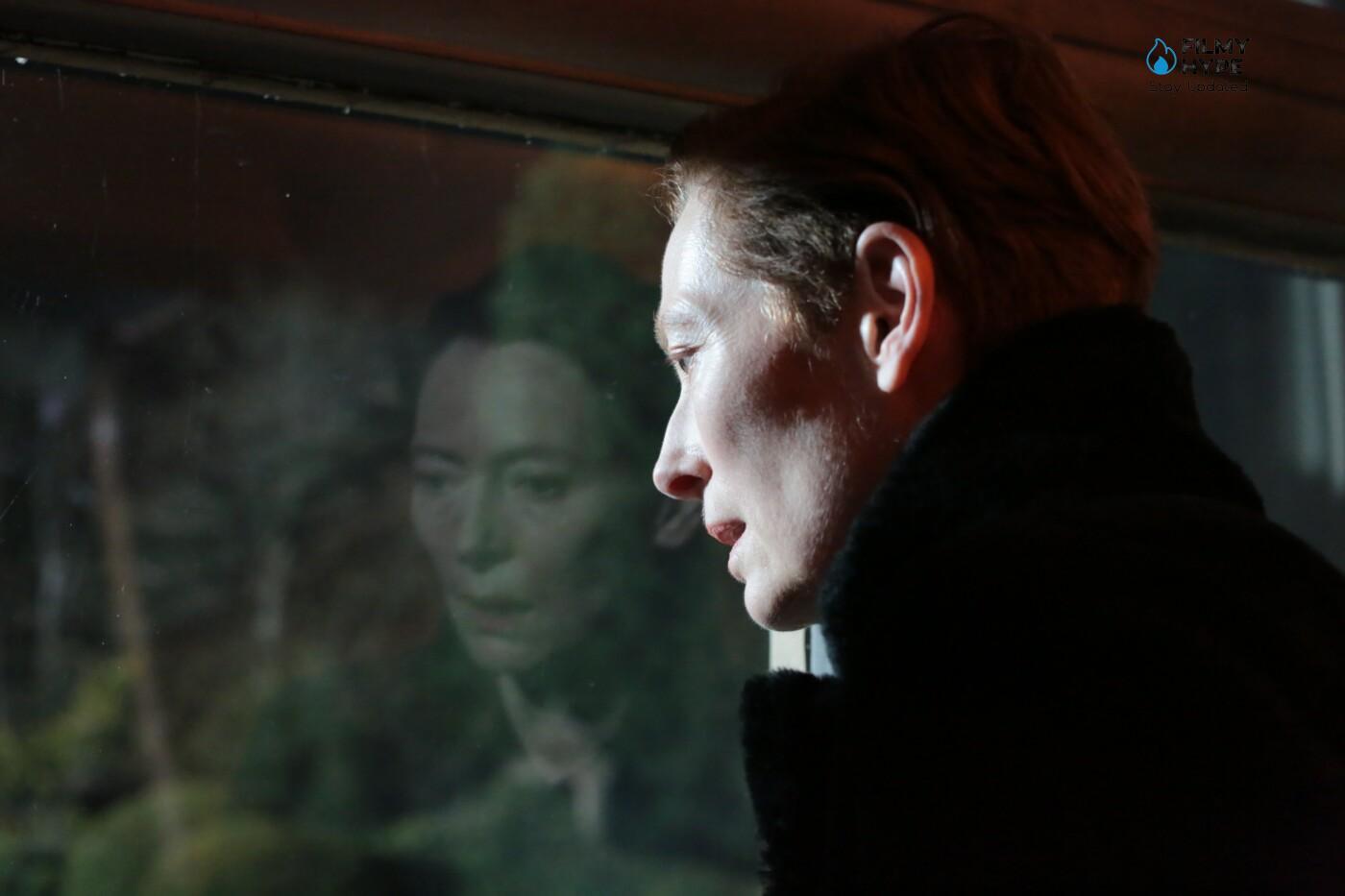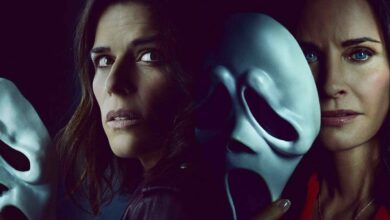The Eternal Daughter Review: A Surprising and Suspenseful Version Of Victorian Gothic (Venice 79)
Stars: Carly-Sophia Davies, Zinnia Davies-Cooke, August Joshi
Director: Joanna Hogg
Filmyhype.com Ratings: 3.5/5 (three and a half star)
With The Eternal Daughter, in competition at Venice 79, Tilda Swinton and Joanna Hogg return to collaborate for the third time, in a film that is configured as the maximum extension of Hogg‘s directorial style, which can only be approached with an awareness of work symbiotic that the two have been carrying out for many years – since their university days – and materialized with the films The Souvenir and The Souvenir 2.

Produced by Element Pictures and distributed worldwide by A24, the film also had the support of Martin Scorsese, who served as executive producer. To make it even more interesting there is the involvement of Tilda Swinton (… and now let’s talk about Kevin, only lovers survive) who, as is now usual for her, brings two characters to the screen.
The Eternal Daughter Review: The Story
The plot of The Eternal Daughter sees an artist (Julie) and her elderly mother (Rosalind) confront long-buried secrets when they return to the old family home, now a hotel haunted by a mysterious past. The Eternal Daughter is a film of a very difficult nature. We need to carry the knowledge that the relationship between Julie and her mother in the two Souvenirs offered us to understand how deeply Hogg wants to go with this ghostly and poignant analysis of the female figure, in which the double facilitates the staging of a relationship generational and Tilda Swinton does not struggle to act, she simply has to respond to the fatigue that underlies the roles of mother and daughter.
Always minimal but extremely rigorous in staging, The Eternal Daughter is Hogg’s most atmospheric film. Always interested in the supernatural, it was already before the Covid-19 pandemic that the director wanted to stage a ghost story. Without a precise script to guide the acting, Tilda Swinton follows the call of natural sounds to reconstruct the history of an indissoluble bond, which arises from the projection of the self into the other, from the idea of the hypnotic puzzle that surrounds the frames of Gothic stories.
The Eternal Daughter Review and Analysis
In The Eternal Daughter, Joanna Hogg uses the codes of gothic cinema to stage a story with the memory of the protagonists at the center. The extreme accentuation of some of the clichés of the genre serves precisely to make her intention clear: she is not interested in making a real horror and the structure serves to effectively stage the tormented interiority of the protagonists. More than by ghosts, they are tormented by memory and guilt. Although not belonging to the world of the paranormal, women’s emotions manifest themselves in a deeply disturbing way, making it unthinkable to be able to live with them. Adherence to the typical stylistic features of horror cinema therefore also takes on another value: it effectively nullifies the differences that separate the spirit manifestations of the deceased from the visions caused by a troubled unconscious. On the other hand, for those who undergo this type of phenomenon, the differences are marginal. In the intentions of its author, The Eternal Daughter is therefore a real ghost story.
The relationship that the director establishes between the staging and the architecture of the building is interesting. The geometry of the frame is often placed in contrast with that of the structure, creating a destabilizing effect, which contributes greatly to the definition of the spectral climate that permeates the film. Inevitable, then, at the center of the scene is always Tilda Swinton. The whole environment is built around her figure, just as the film is built around her interpretation. There are two sources of power for the narrative engine: the relationship between the two characters brought to the stage by the actress and the one that is established between them and the villa. It is an authorial operation performed with great care, but also an end in itself. As much as one can appreciate her elegance, The Eternal Daughter is fundamentally an exercise in style, fascinating but not very meaningful.
To make this apparatus less incisive, the final contributes not a little, in which the conflicts are liquidated by an uninspired twist. This does not mean that the film is not appreciable, on the contrary. The quality of the work carried out by Hogg and her collaborators guarantee a pleasant vision and, in the passages where it is more conceded to the genre, even frightening. At the same time, given the ephemeral nature of the operation, we do not believe that it is destined to remain etched in the memory.
As visually intriguing as it is, The Eternal Daughter paradoxically loses itself in the confined space that it chooses as its setting, a ghostly hotel with an indisputable visual impact, which nevertheless echoes flashes of what could have been The Souvenir 3. In the acting redundancy – we already knew so much about mother and daughter from previous films – Joanna Hogg’s latest effort is almost inaccessible, a victim of the expansion of a timeline that only the director and actress know, and the viewer can’t be able to immerse yourself in it as well. The Eternal Daughter is the result of fifteen-year conversations between Swinton and Hogg, who have questioned for a long time about the generational gap between them – daughters with an artistic vocation – and their mothers, very refined and highly placed, for which an artistic profession could not be contemplated at all.
Not everyone has sons or daughters, but everyone has a mother and we are sons. Tilda/Julie/Rosalind decides to identify with both points of view, trying to sympathize with these projections of the self, not to be frightened and to show that the conversation between the two sides always continues, it doesn’t have to end according to the rhythms of nature, but to nourish the time to come. In their time together, Julie and Rosalind share the same voice and the same face. Both age little by little, but they have the time to give voice to the greatest fear of children and mothers: to have done something wrong, not to have been up to par. A continuous, therapeutic but extremely poignant confrontation, which makes eternity the key to (re) reading the filmography of an extremely autobiographical artist who still does not want to finish telling herself.
We conclude the review of The Eternal Daughter by saying that Hogg and Swinton playfully explored how the film could be together, with the shortcut of knowing each other for decades. They had the gender freedom – to go beyond the relatively naturalistic constraints of a project like A Souvenir – and, with that, they had endless possibilities. Hogg doesn’t even write dialogue for his films, instead collaborating with his actors once they are chosen. So Swinton was already in the trenches with the director, sculpting Julie and, in turn, her character’s relationship with her mother from scratch. For this, Swinton came up with a crazy idea, or maybe not that crazy, if you know it. What if she plays mother and daughter?
Tilda Swinton has already done it, more or less. Let’s not forget Suspiria, Luca Guadagnino’s artistic horror remake from 2018 in which we all thought she was playing two distinct characters, until it was revealed that no, in fact, she would also be playing a third. But while that bloodthirsty thriller came closer to the scary and the supernatural, The Eternal Daughter considers its ghosts – and the characters walking among them – in a more plaintive sense. Swinton taking on the two main roles turns out to be less of an exercise in cinematic deception and more of emotional intensity.
As Julie, Swinton wanders the corridors of the hotel with a calm and overwhelming sense of guilt, choosing the life of an artist over motherhood and dealing with her mother’s unhappiness as a result; as Julie’s mother, Rosalind – yes, you should note, the same name as the character from Swinton’s Souvenir – the actor becomes very reserved, as if he has some sort of secret. Reuniting with DP Ed Rutherford for the first time since the 2013 show, Hogg found Swinton’s double performance deeply moving. Very rarely do the two characters appear in the same frame – it’s completely gimmicky as Hogg, Rutherford, and Swinton have focused on the unique thematic terrain of mother and daughter sharing this fundamental part of each other.
The Eternal Daughter Review: The Last Words
To fully immerse yourself in the atmosphere of The Eternal Daughter it is necessary to understand the symbiotic work that Joanna Hogg and Tilda Swinton have been doing for years. Redundant in its narrative structure – despite being the director’s most atmospheric film – this third proof by Hogg is certainly a step back, or an unsolicited third version, of the two The Souvenirs. We conclude the review of The Eternal Daughter by saying that there is such closeness and tenderness in this film. It reveals itself in a moment when the mother briefly stumbles upon the restaurant table and her daughter is instantly alarmed by the possibility of her falling, and then turns that palpable alarm into something reassuring. The Eternal Daughter is a serious and gentle moment of self-disclosure for Joanna Hogg.






